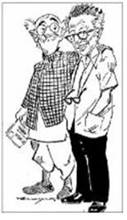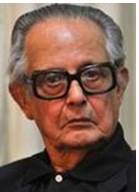By Kollengode S Venkataraman
e-mail: Â ThePatrika@aol.com
Recently, Rasipuram Krishnaswamy Laxman, the most celebrated cartoonist of India and the father of the dhoti-clad Common Man (archaic in today’s Indian metros) died at 94 in Pune after a well-deserving, well-earned, illustrious career spanning several decades.
Decades ago, Bombaywallahs — now Mumbaikars — and people in many other cities started their day only after reading Laxman’s “You Said It†cartoons in the Times of India. No one – whether politicians, the babus (bureaucrats), the poor, the rich, or the vainglorious  — escaped Laxman’s skewering, yet humorous wit focusing on human foibles, hypocrisy and inner contradictions.
He was keenly observant, very much in touch with the pulse of urban Indians, a common trait among social commentators whether columnists or cartoonists. His obituary ran in the English media worldwide. Tributes in India were torrential.
He was cremated in a private ceremony in Pune. The Maharashtra government gave him a ceremonial state funeral, a great honor for a cartoonist.
Lavishly praising the dead while overlooking their imperfections is an Asian trait. There is a popular and cynical saying in Tamil, settavan kannu sentaamarai, which translates in Hindi as murdaa kaa aankh gulaabi-kamal. In English, this would mean “The dead have golden eyes.† There is no popular English equivalent expression though, probably because there is no inhibition in critiquing the dead.
After Laxman’s death, his son Srinivas, a journalist with the Times of India, talked to his colleagues reminiscing his dad. One point he said is worthy of our attention (www.tinyurl.com/Laxman-Srinivas):
Srinivas said that the legendary cartoonist never conformed to rituals. “My father was accorded a simple funeral, without the rituals he himself never followed. I still remember my father’s reaction when he heard the news of his mother passing away . He had this habit of sitting with a drink at 9pm and listening to the radio. One day, he received a phone call from his brother informing him of his mother’s demise. She had passed away in Mysore. My father was immensely shaken with the news, but did not go to Mysore. He was very progressive; he did not observe rituals and was not a traditionalist,†said Srinivas.
Obviously, the other siblings of Laxman in Mysore who took care of his mother in her last days — a far more difficult responsibility if she was bed-ridden in her old age — also took care of her cremation.
Death rites are quite simple compared to providing hospice care for old people till they pass on. In India, even today, the options for hospice care are few even for its professional middle class, not to speak of India’s working poor. People taking care of old sick parents know this.
If Laxman had personal reasons for not going to his mother’s funeral, we need to respect and honor his private decision, and it would have been graceful for Srinivas to leave this biographical detail of his father private. But Srinivas went public on this, trying to correlate Laxman’s persona as a non-traditionalist and non-believer in rituals with he not going to his mother’s funeral rituals. This was unnecessary to say the least.
What has R. K. Laxman’s non-belief in rituals and traditions anything to do with Laxman not going to his mother’s funeral in Mysore? Honestly, is there any correlation between one’s non-belief in rituals and one not going to the funeral of one’s parents?
Laxman, decades ago, did not believe in the old rituals for his mother’s last rites. Such a radical departure from tradition decades ago would have jibed well if Laxman, given his star image, had instructed his son not to follow contemporary death rituals like public viewing, wreath-laying, etc. And the non-traditionalist Laxman’s son conformed to the “modern†traditions and rituals associated with a state funeral even as he was disdainful of “old†rituals.
Ever since Homo Sapiens started living in social groups for collective security, mankind in different parts of the world independently evolved norms and conventions for its members to follow to make human interactions predictable and meaningful. Death rituals, whether contemporary or old, are part of these norms for people to gather to mourn and reminisce the departed.
These norms, necessary for enabling all kinds of transactions needed among people, are contextual with respect to time, place, culture and other factors. And they have been evolving through the millennia.
And today’s “progressive†ways of taking care of the dead are tomorrow’s dogmas, traditions and empty rituals. After all, all rituals are always in transition all the time.    ♦


